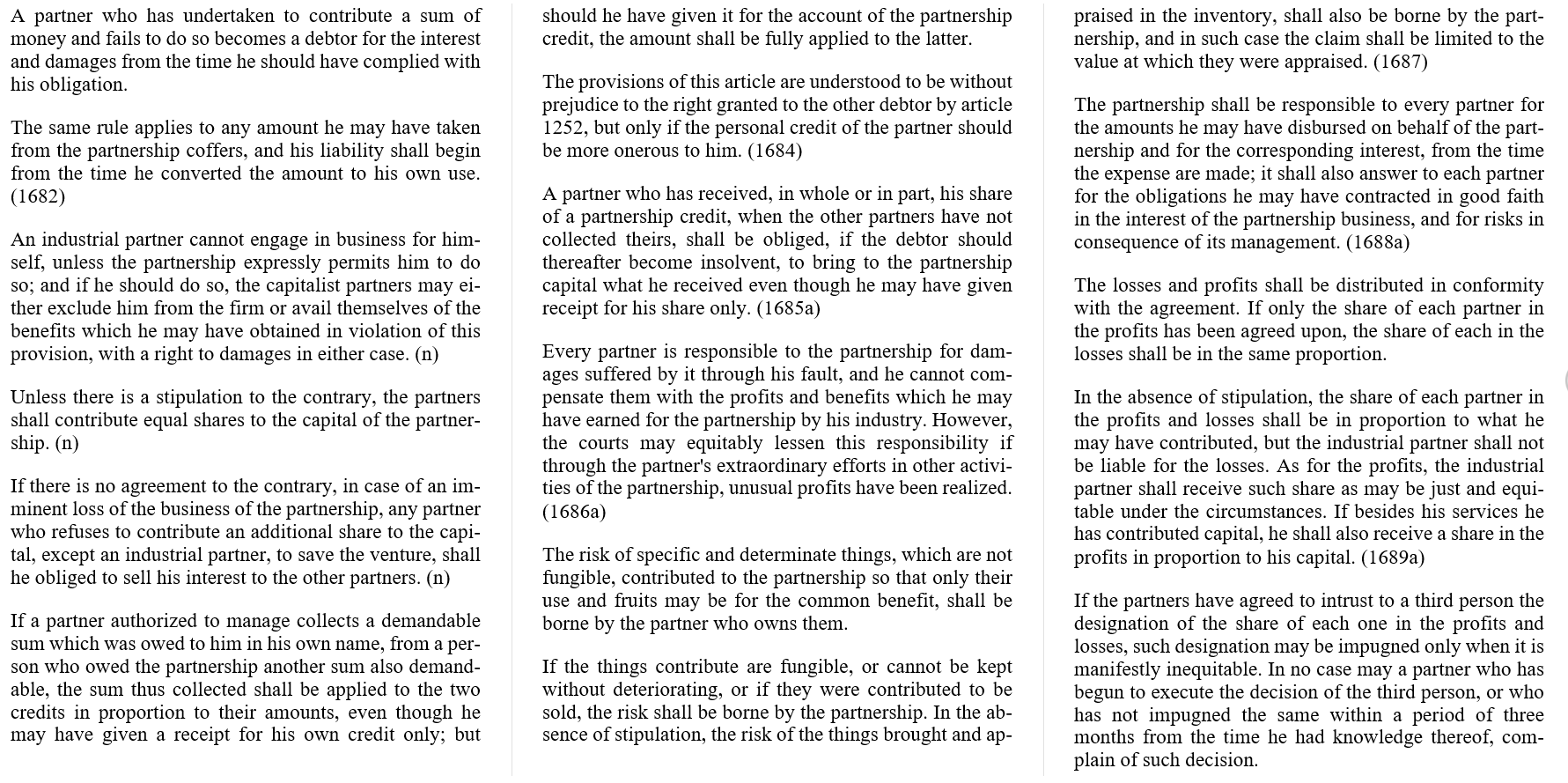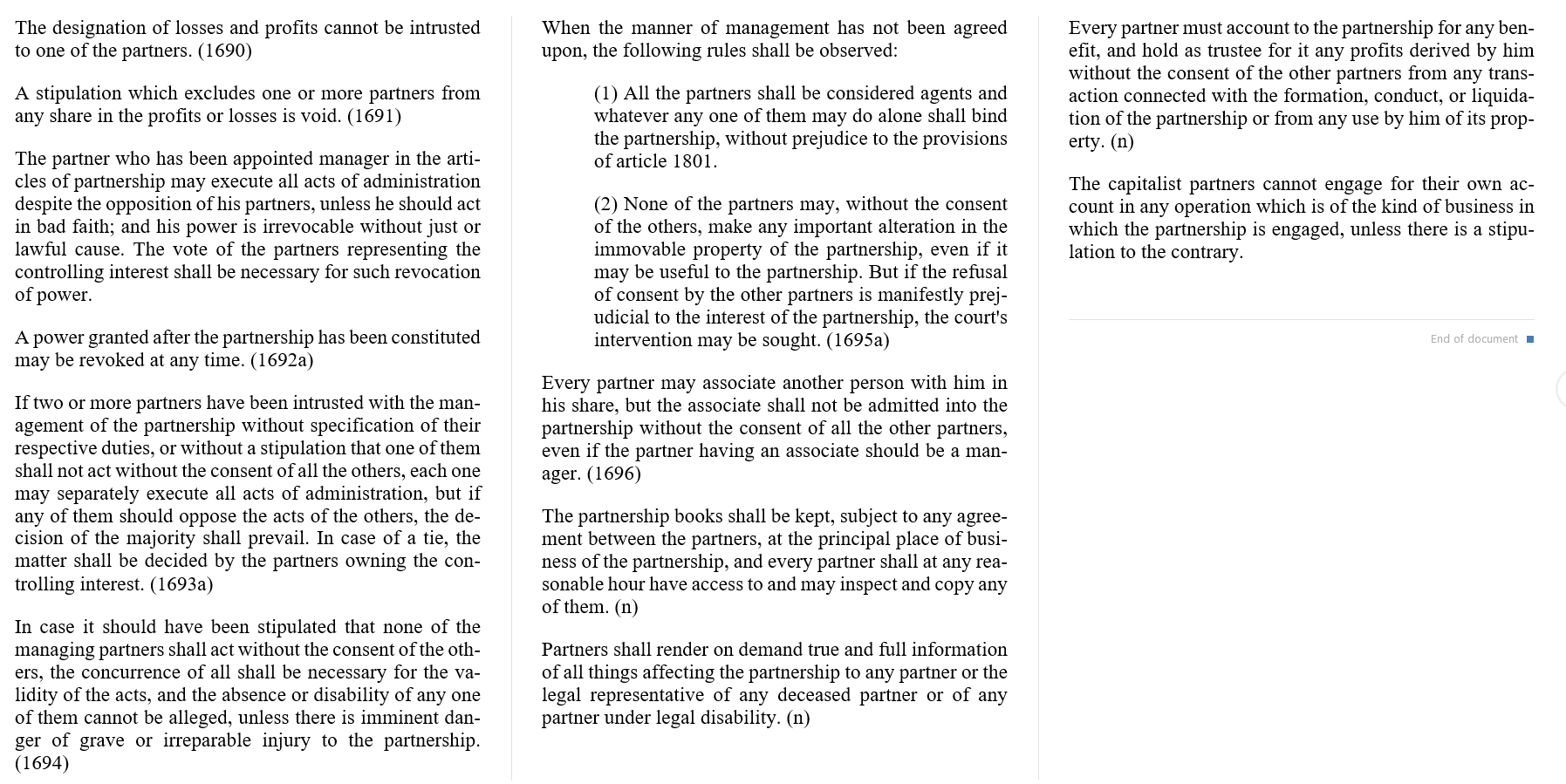


SUBJECT: BUSINESS LAWS AND REGULATIONS
kindly refer to the module below.
A partner who has undertaken to contribute a sum of money and fails to do so becomes a debtor for the interest and damages from the time he should have complied with his obligation. The same rule applies to any amount he may have taken from the partnership coffers, and his liability shall begin from the time he converted the amount to his own use. (1682) An industrial partner cannot engage in business for him- self, unless the partnership expressly permits him to do so; and if he should do so, the capitalist partners may ei ther exclude him from the rm or avail themselves of the benets which he may have obtained in violation of this provision, with a right to damages in either case. (11) Unless there is a stipulation to the contrary, the partners shall contribute equal shares to the capital of the partner ship. (n) If there is no agreement to the contrary, in case of an im- minent loss of the business of the partnership, any partner who refuses to contribute an additional share to the capi tal, except an industrial partner, to save the venture, shall he obliged to sell his interest to the other partners. (11) If a partner authorized to manage collects a demandable sum which was owed to him in his own name, from a per son who owed the partnership another sum also demand- able, the sum thus collected shall be applied to the two credits in proportion to their amounts, even though he may have given a receipt for his own credit only; but should he have given it for the account of the partnership credit, the amount shall be fully applied to the latter. The provisions of this article are understood to be without prejudice to the right granted to the other debtor by article 1252, but only if the personal credit of the partner should be more onerous to him. (1684) A parhzrer who has received, in whole or in part, his share of a partnership credit, when the other partners have not collected theirs, shall be obliged, if the debtor should thereafter become insolvent, to bring to the partnership capital what he received even though he may have given receipt for his share only. (1685a) Every partner is responsible to the partnership for dam- ages suffered by it through his fault, and he cannot com- pensate them with the prots and benets which he may have earned for the partnership by his industry. However, the com1s may equitably lessen this responsibility if through the partner's extraordinary efforts in other activi- ties of the partnership, unusual prots have been realized. ( 168 6a) The risk of specic and determinate things, which are not fungible, contributed to the partnership so that only their use and fruits may be for the common benet, shall be home by the partner who owns them. If the things contribute are fungible, or cannot be kept without deteriorating, or if they were contributed to be sold, the risk shall be borne by the partnership. In the ab sence of stipulation, the risk of the things brought and ap- praised in the inventory, shall also be home by the part- nership, and in such case the claim shall be limited to the value at which they were appraised. (1687) The partnership shall be responsible to every partner for the amounts he may have disbursed on behalf of the part- nership and for the corresponding interest, from the time the expense are made; it shall also answer to each partner for the obligations he may have contracted in good faith in the interest of the partnership business, and for risks in consequence of its management. (1688a) The losses and prots shall be distributed in conformity with the agreement. If only the share of each partner in the prots has been agreed upon, the share of each in the .osses shall be in the same proportion. 11 the absence of stipulation, the share of each partner in he prots and losses shall be in proportion to what he may have contributed, but the industrial partner shall not be liable for the losses. As for the prots, the industrial partner shall receive such share as may be just and equi able under the circumstances. If besides his services he Jas contributed capital, he shall also receive a share in the prots in proportion to his capital. (16893.) f the partners have agreed to intrust to a third person the designation of the share of each one in the prots and .osses, such designation may he impugned only when it is manifestly inequitable. In no case may a partner who has begun to execute the decision of the third person, or who 13.5 not impugned the same within a period of three months from the time he had knowledge thereof, com- plain of such decision. The designation of losses and prots cannot be intrusted to one of the partners. (1690) A stipulation which excludes one or more partners from any share in the prots or losses is void. (1691) The partner who has been appointed manager in the arti- cles of partnership may execute all acts of administration despite the opposition of his partners, unless he should act in bad faith; and his power is irrevocable without just or lawful cause. The vote of the partners representing the controlling interest shall be necessary for such revocation of power. A power granted aer the partnership has been constituted may be revoked at any time. (1692a) If two or more partners have been intrusted with the man- agement of the pannership without specication of their respective duties, or without a stipulation that one of them shall not act without the consent of all the others, each one may separately execute all acts of administration, but if any of them should oppose the acts of the others, the de cision of the majority shall prevail. In case of a tie, the matter shall be decided by the partners owning the con- trolling interest. (1693a) In case it should have been stipulated that none of the managing partners shall act without the consent of the oth ers, the concurrence of all shall be necessary for the va- lidity of the acts, and the absence or disability of any one of them cannot be alleged, unless there is imminent dan- ger of grave or irreparable injury to the partnership. (1694) When the manner of management has not been agreed upon, the following rules shall be observed: (1) All the partners shall be considered agents and whatever any one of them may do alone shall bind the partnership, without prejudice to the provisions ofarticle 1801. (2) None of the partners may, without the consent of the others, make any important alteration in the immovable property of the partnership, even if it may be useful to the partnership. But if the refusal of consent by the other partners is manifestly prej- udicial to the interest of the partnership, the court's intervention may be sought. (1695a) Every partner may associate another person with him in his share, but the associate shall not be admitted into the partnership without the consent of all the other partners, even if the partner having an associate should be a man ager. (1696) The partnership books shall be kept, subject to any agree ment between the partners, at the principal place of busi- ness of the partnership, and every partner shall at any rea sonable hour have access to and may inspect and copy any of them. (n) Partners shall render on demand true and full information of all things affecting the partnership to any partner or the legal representative of any deceased partner or of any partner under legal disability. (n) Every partner must account to the partnership for any ben et, and hold as trustee for it any profits derived by him without the consent of the other partners from any trans action connected with the formation, conduct, or liquida- tion of the partnership or from any use by him of its prop ey- (n) The capitalist partners cannot engage for their own ac- count in any operation which is of the kind of business in which the partnership is engaged, unless there is a stipu- lation to the contrary. EIILI of Ll':".lll\"lll l REQUIRED: 1. Pick the most important lesson in the module and explain why it is important. 2. In summary, what is the module all about












